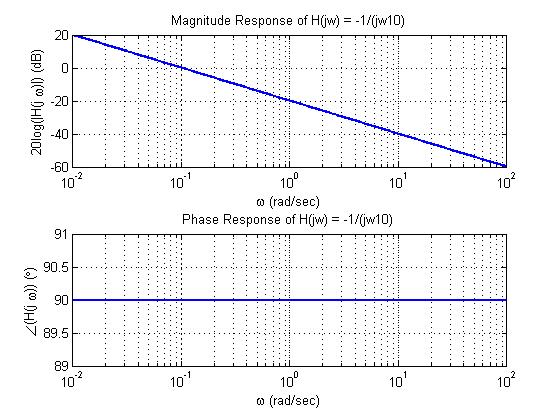Plotting Frequency Responses using Matlab
(Amplitude/Magnitude in dB, Frequency on Logarithmic Axes)
M-file:
%% EE 212 - FrequencyResponseExample3.m
%
% Description: M-file showing Bode Plots (via Matlab) for in-class examples.
%
%% Clear memory; clear command window; close all existing figures
clear; clc; close all;
%% H(jw) = jw10
% vector of 250 logarithmically-spaced frequencies between 10^-2 and 10^2
w = logspace(-2,2,250);
H = j*w*10; % (complex) transfer function
figure(1); % open first figure
% plot magnitude response in top half of first figure, and label
subplot(2,1,1);
semilogx(w, 20*log10(abs(H)), 'linewidth', 2);
grid;
xlabel('\omega (rad/sec)'); ylabel('20log(|H(j \omega)|) (dB)')
title('Magnitude Response of H(jw) = jw10');
% plot phase response (using degrees) in bottom half of first figure, and label
subplot(2,1,2);
semilogx(w, unwrap(angle(H))*180/pi, 'linewidth', 2);
grid;
xlabel('\omega (rad/sec)'); ylabel('\angle(H(j \omega)) (\circ)')
title('Phase Response of H(jw) = jw10');
%% H(jw) = -1/(jw10)
% vector of 250 logarithmically-spaced frequencies between 10^-2 and 10^2
w = logspace(-2,2,250);
H = -1./(j*w*10); % (complex) transfer function
figure(2); % open second figure
% plot magnitude response in top half of first figure, and label
subplot(2,1,1);
semilogx(w, 20*log10(abs(H)), 'linewidth', 2);
grid;
xlabel('\omega (rad/sec)'); ylabel('20log(|H(j \omega)|) (dB)')
title('Magnitude Response of H(jw) = -1/(jw10)');
% plot phase response (using degrees) in bottom half of first figure, and label
subplot(2,1,2);
semilogx(w, unwrap(angle(H))*180/pi, 'linewidth', 2);
grid;
xlabel('\omega (rad/sec)'); ylabel('\angle(H(j \omega)) (\circ)')
title('Phase Response of H(jw) = -1/(jw10)');
%% H(jw) = 100(jw+200)/((jw)(jw+5000))
% vector of 250 logarithmically-spaced frequencies between 10^0 and 10^5
w = logspace(0,5,250);
H = 100*(j*w+200)./((j*w).*(j*w+5000)); % (complex) transfer function
figure(3); % open third figure
% plot magnitude response in top half of first figure, and label
subplot(2,1,1);
semilogx(w, 20*log10(abs(H)), 'linewidth', 2);
grid;
xlabel('\omega (rad/sec)'); ylabel('20log(|H(j \omega)|) (dB)')
title('Magnitude Response of H(jw) = 100(jw+200)/((jw)(jw+5000))');
% plot phase response (using degrees) in bottom half of first figure, and label
subplot(2,1,2);
semilogx(w, unwrap(angle(H))*180/pi, 'linewidth', 2);
grid;
xlabel('\omega (rad/sec)'); ylabel('\angle(H(j \omega)) (\circ)')
title('Phase Response of H(jw) = 100(jw+200)/((jw)(jw+5000))');
Figures/Plots Generated:


